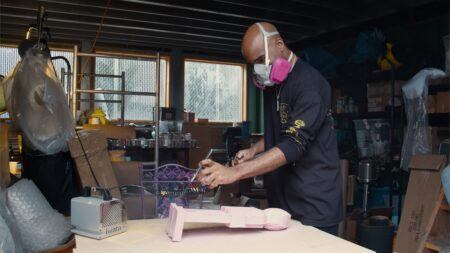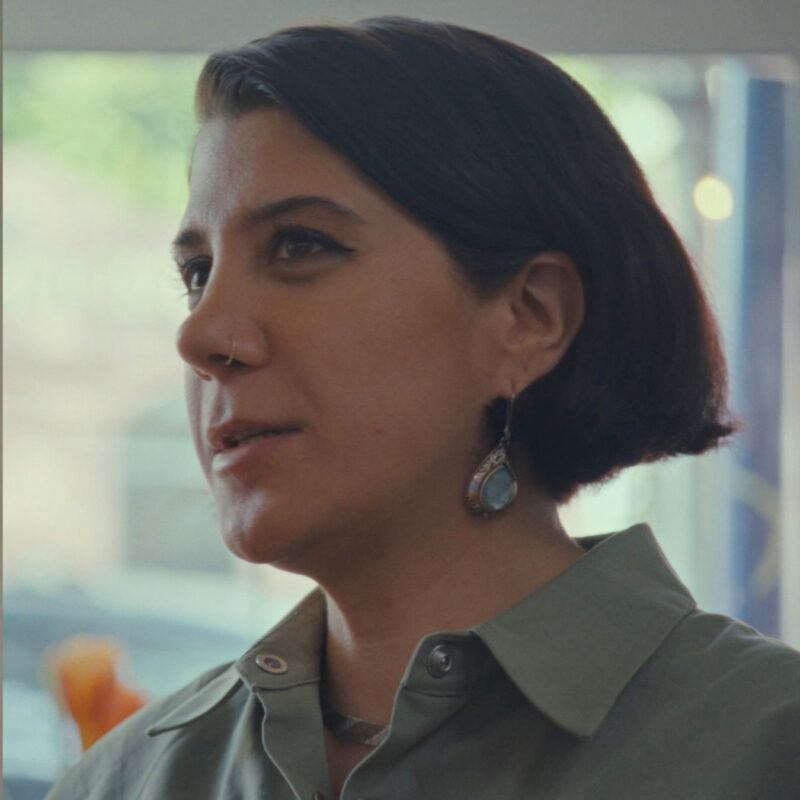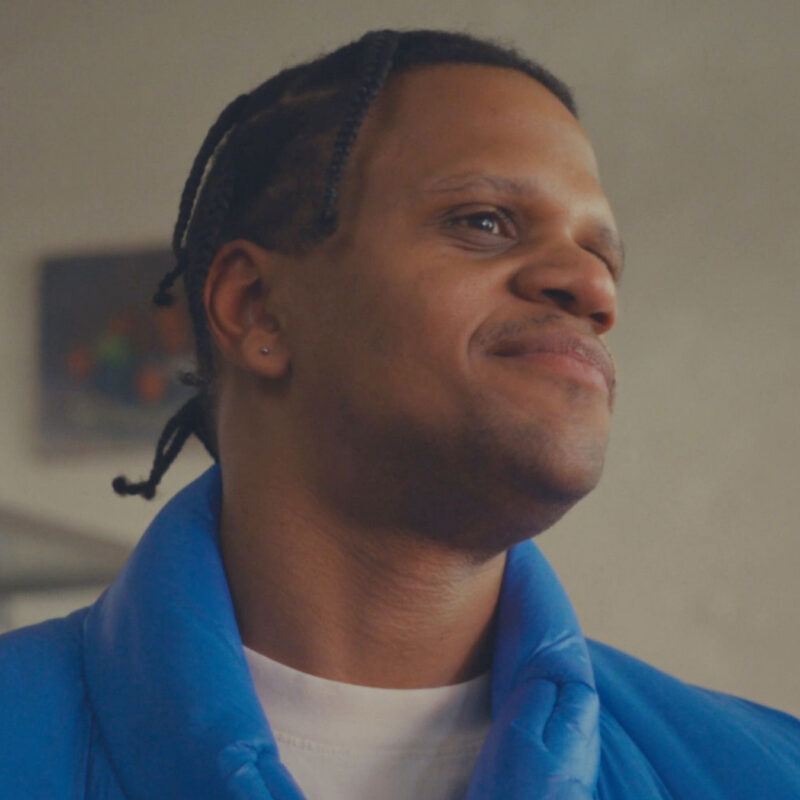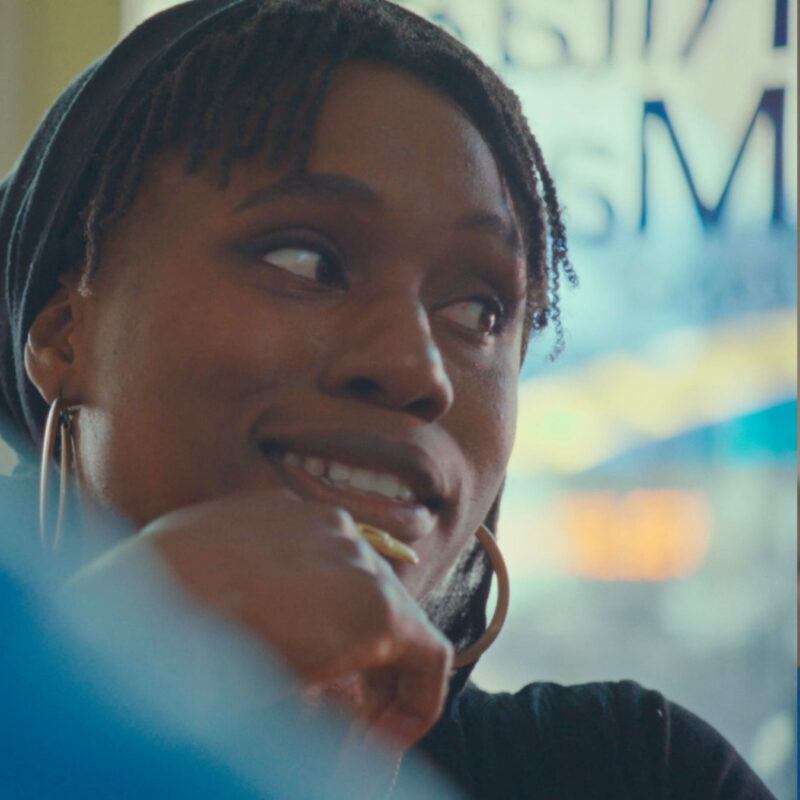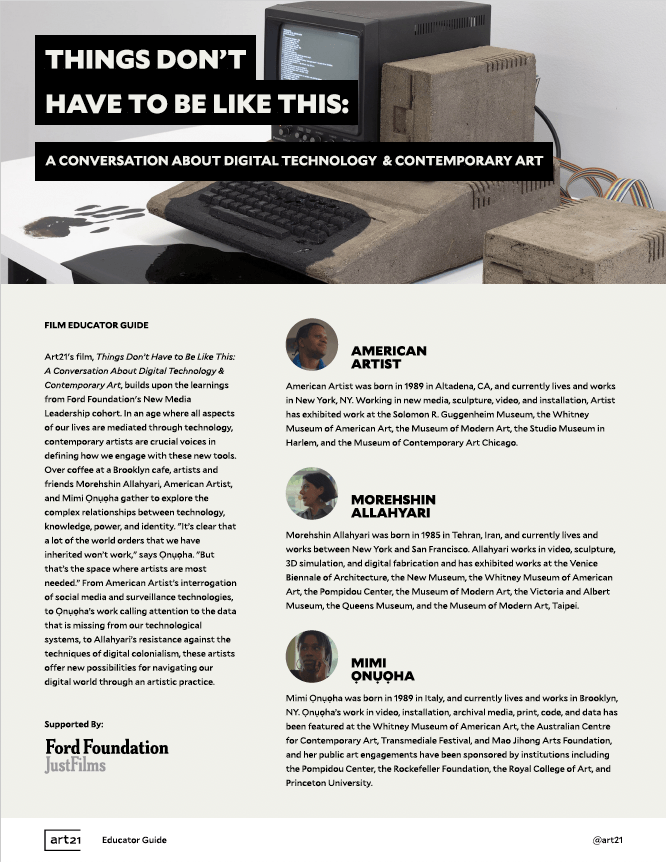Continue playing
(Time remaining: )
Play from beginning
Continue playing "{{ controller.videos[controller.getVideo(controller.currentVideo)].segmentParentTitle}}"
{{controller.videos[controller.getVideo(controller.currentVideo)].title}} has ended.
Things Don't Have to Be Like ThisMorehshin Allahyari, American Artist, and Mimi Ọnụọha
In an age where all aspects of our lives are mediated through technology, contemporary artists are crucial voices in defining how we engage with these new tools. Over coffee at a Brooklyn cafe, artists and friends Morehshin Allahyari, American Artist, and Mimi Ọnụọha gathered to explore the complex relationships between technology, knowledge, power, and identity. “It’s clear that a lot of the world orders that we have inherited won’t work,” says Ọnụọha. “But that’s the space where artists are most needed.” From American Artist’s interrogation of social media and surveillance technologies, to Ọnụọha’s work calling attention to the data that is missing from our technological systems, to Allahyari’s resistance against the techniques of digital colonialism, these artists offer new possibilities for navigating our digital world through an artistic practice.
Produced with support from the Ford Foundation, “Things Don’t Have to Be Like This” builds on the learnings of the JustFilms New Media Leadership cohort, conceived to further explorations of technology, community, and making through a critical lens.
Credits
Director: J.M. Harper. Editor: Byron Leon. Producer: Scott Lane. Director of Photography: Eric Schleicher. 1st Assistant Camera: Andrew Keefe. 2nd Assistant Camera: Cameron Wilber. Gaffer & Key Grip: Gleydi Santana, Chris Violette. Location Sound: Hyo Jin An. Production Assistants: Tim Lopez, Ross Sloan.
Music: Kevin Leahy, Ian Post, Yehezkel Raz, Some Were at Sea. Design & Animation: Christian Mroczka, Diffan Norman. Color Grade: Mary Perrino. Assistant Editor: Stella Guggenheim, Nina Vallado. Sound Design & Mix: Matthew Ericson.
Artwork Courtesy: Morehshin Allahyari; American Artist; Mimi Ọnụọha; Andrew Curtis; Australian Centre for Contemporary Art, Melbourne. Archival Media: Stephan Knuesel; Rhizome; Solomon R. Guggenheim Museum, New York; Midge Wattles.
Thanks: Sarah Abramjuk, Jon-Sesrie Goff, Christina Ludgood, Rita & Maria, The Morgan Library & Museum, Chi-hui Yang.
Supported by: Ford Foundation JustFilms
Produced by: Art21
©Art21, Inc. 2025
All Rights Reserved
Closed captionsAvailable in English, German, Romanian, Italian, Japanese, Korean, Chinese, Italian
Through the Art21 Translation Project, multilingual audiences from around the globe can contribute translations, making Art21 films more accessible worldwide.
Interested in showing this film in an exhibition or public screening? To license this video please visit Licensing & Reproduction.
Morehshin Allahyari was born in 1985 in Tehran, Iran, and currently lives and works between New York and San Francisco, California. Allahyari received her BA from the University of Tehran in 2007, her MA from the University of Denver in 2009, and her MFA in new media art from the University of North Texas in 2012. Through video, sculpture, and installation, Allahyari calls attention to colonial power dynamics present today and discovers new ways of archiving and interpreting the history, myths, and artifacts of the Middle East and North Africa. Using virtual reality, simulation software, 3D scanning, digital fabrication, and multimodal artificial intelligence, the artist considers how technology can be used as a tool of extraction and erasure alongside demonstrating its liberatory potential.
American Artist was born in 1989 in Altadena, CA, and currently lives and works in New York, NY. The artist received their BFA from California Polytechnic State University in 2011 and their MFA from Parsons School of Design in 2015. Through photography, sculpture, video, and software, Artist investigates the development of our contemporary technological landscape and considers how our identities are filtered through and shaped by such technologies. By working within the structures they critique, such as social media or surveillance technology, the artist addresses the intertwined histories of systemic racial discrimination and technological advancement in order to imagine alternative ways of living within this paradigm.
Mimi Ọnụọha was born in 1989 in Parma, Italy and currently lives and works in Brooklyn, NY. Ọnụọha earned her B.A. in anthropology from Princeton University and later her MPS from NYU’s Interactive Telecommunications Program. Through her multimedia and archive-based practice encompassing code, installation, video, and performance, the artist investigates the power dynamics inherent in data collection and technology and how data shapes and limits our understanding of the world. Her work often highlights patterns of absence or “blank spots” that emerge from reducing complexities to finite data sets, drawing attention to the biases embedded in the data collection processes.
JustFilms New Media Leadership Cohort
Afrotectopia
Afrotectopia is a social institution at the intersection of art, design, technology, culture, and pedagogy. The organization was established in 2018 in New York when NYU Interactive Telecommunications (IT) graduate student Ari Melenciano wanted to create a space that convened individuals working in art, technology, activism, and Blackness. What began as a conference has evolved into an international fellowship bridging connections across the Black and Pan-African diaspora. In 2021, Afrotectopia partnered with NYU’s IT program and MIT’s Space Exploration Initiative to create an incubator program that imagined a new world, not only on Earth. The incubator selected four artists, Jordan Caldwell, Kordae Henry, Jeremy Kamal, and Ari Melenciano, who worked together to develop Black Metal, an art book centered around the relationship between science fiction, Black culture, art, and technology. Black Metal has expanded into an imagination-centered practice with space travel and science fiction as protocols for understanding the world around us.
Art+Feminism
Art+Feminism is an organization that builds a community of activists committed to closing information gaps related to gender, feminism, and the arts, beginning with Wikipedia. Founded in 2014 in New York City, Art+Feminism envisions an internet that reflects diverse global histories of art-making, where communities that have most often been written out of history feel welcomed and empowered to participate in writing (and righting) their stories. Art+Feminism’s central initiative is an annual edit-a-thon, teaching people of all gender identities and expressions worldwide to organize and edit Wikipedia pages through locally facilitated events. The organization provides edit-a-thon organizers with informational and limited financial resources, empowering them to create events that benefit their local communities while participating in a global movement. Art+Feminism also leads and collaborates on Wikipedia-oriented research and community action initiatives. Since 2014, over 40,000 people have participated in more than 1,700 edit-a-thons, resulting in the creation and improvement of more than 370,000 articles in over 27 languages on Wikipedia and its sister projects.
BUFU is By Us For Us
BUFU is By Us For Us is a project-based collective founded in 2015 by Jazmin Jones, Tsige Tafesse, Katherine Tom, and Suhyun “Sonia” Choi. The collective initially began in the experimental documentary space as a means of facilitating a global conversation on the cultural contact between Black and Asian diasporas, with an emphasis on building solidarity, de-centering whiteness, and resurfacing the deeply interconnected and complicated histories of both identities. It has since evolved into a space that builds solidarity through experimental models of organizing and making, generating prestige, and mining time as a resource. From 2015-2020, BUFU organized The WYFY School (With You For You), a decentralized, communally manifested school that hosted classes and programming in NYC and online. In 2020, BUFU created CLOUD 9, a global platform that shares love, care, and solidarity with those impacted by COVID-19. CLOUD 9 organized 86 public programs in collaboration with 90 artists, scholars, technologists, activists, and dreamers and hosted two 24-hour party celebrations. Now, BUFU acts as an evolving living archive with endless possibilities for growth and change.
Dark Laboratory
Dark Laboratory is a creative technology collective, production company, and design studio that Tao Leigh Goffe founded in the summer of 2020 in upstate New York, close to the Underground Railroad. Although Dark Laboratory has since moved to New York City, the collective maintains its interest in personal geographies and the layered, sedimented presence of race in the United States. Dark Laboratory consists of technologists, scholars, artists, and theorists who use immersive technologies such as VR, AR, sound design, films, and video games to produce solutions for tackling the climate crisis and racial injustice. In an effort to bridge the gap between formal institutions and decentralized communities, Dark Laboratory prioritizes community knowledge over higher education, listening to and learning from local cultivators, practitioners, and artists. Some of the lab’s work includes peer-reviewed journal publications, contemporary art installations, commissioned multi-sensorial activations and performances, curatorial writing, podcasts, and master classes and writing circles. Dark Laboratory’s advisory board includes Julie Dash, Henry Louis Gates Jr., Fred Moten, Stanley Nelson, and Tracy K. Smith, among others.
Kinfolk
Kinfolk (previously known as Movers & Shakers) is an organization that harnesses emerging technologies to empower stories of Black, Brown, and queer communities in public spaces through imagination and play. Founded in 2017 by Idris Brester and Glenn Cantave, Kinfolk is a downloadable app that uses augmented reality to inscribe Black and Brown history into the American educational curricula. Kinfolk creates AR-generated monuments of historically accurate yet underrepresented historical figures such as Shirley Chisholm, Fannie Lou Hamer, Toussaint Louverture, and Gaspar Yanga. In addition to the augmented reality image of each figure, the organization also offers archival material and biographical information from which users can learn. Kinfolk has also created UNSUNG, a multiuser, interactive augmented reality learning app that educates students about the Harlem Renaissance through the stories of Florence Mills and Tiny Davis.
POWRPLNT
POWRPLNT is a media arts organization that empowers individuals to bridge the digital divide by organizing community interactions that elevate digital literacy and encourage expression through technology. Founded in 2014 by Angelina Dreem and Anibal Luque in Bushwick, Brooklyn, POWRPLNT delivers resources, mentorship, and education to the next generation of creators. The organization provides digital arts education and access for all, with a focus on connecting emerging media artists and young adults so they can learn tangible creative skills and pursue their passions, based on the belief that access to technology is a right, not a privilege. Through digital art workshops and activations, the organization offers courses led by trailblazing teaching artists, focused on tools and techniques for digital art production. Annually, POWRPLNT collaborates with around 100 emerging media artists and organizes over 80 art projects. Since its inception, the organization has engaged roughly 1,500 young creatives in workshops centered around community, creativity, and digital literacy. In addition to courses and seminars, POWRPLNT also hosts POWRPLNT Rad.io, a collaborative radio show and music-focused series that highlights up-and-coming musicians, emerging DJs, and nightlife veterans.
Processing Foundation
Processing Foundation was founded in 2001 by Ben Fry and Casey Reas to increase digital literacy and promote software learning within the arts. Their goal is to support individuals of all backgrounds in learning how to program and make creative work with code, with a particular focus on communities frequently marginalized by dominant technology. At the core of the Processing Foundation is the philosophy and politics of FLOSS: free/libre, open-source software. With the belief that learning to code is a creative and exploratory process, Processing Foundation has developed tools such as Processing (Java), a language for learning how to code; p5.js (JavaScript), an accessible tool for learning to code and make art, and Processing Android, a software that helps individuals easily create Android apps. In addition to their software and applications, the Processing Foundation also sponsors various programs that bring together diverse communities. These programs include fellowships that aim to reimagine access and empowerment at the intersection of art and technology, advocacy programs, and public events and panels.
School for Poetic Computation (SFPC)
School for Poetic Computation (SFPC) is an experimental school founded in 2013 by Taeyoon Choi, Zach Lieberman, Jen Lowe, and Amit Pitaru. SFPC is based in New York City and offers online courses to participants worldwide. SFPC facilitates the study of art, code, hardware, and critical theory through lenses of decolonization and transformative justice. It offers programs grounded in solidarity across social differences and empowerment through a deeper technical and political understanding of tools for building just communities. Courses cover a range of subjects, from Damage Overflow Value: Race in Video Games to Solidarity Infrastructures to Interrogating Computational Approaches to Art. SFPC organizers, teachers, and participants regularly collaborate to define and redefine “poetic computation” through publications, online and in-person showcases and exhibitions, websites, special sessions, event series, and radio productions. Examples include the publication Speculative Instruments of the Black Gooey Universe, the Electronic Cafe for Poetic Computation exhibition, and SFPC_Malware_Anthology.zip, a downloadable zip-file collection of software art.
“It’s clear that a lot of the world orders that we have inherited won’t work. But that’s the space where artists are most needed.”
Mimi Ọnụọha
